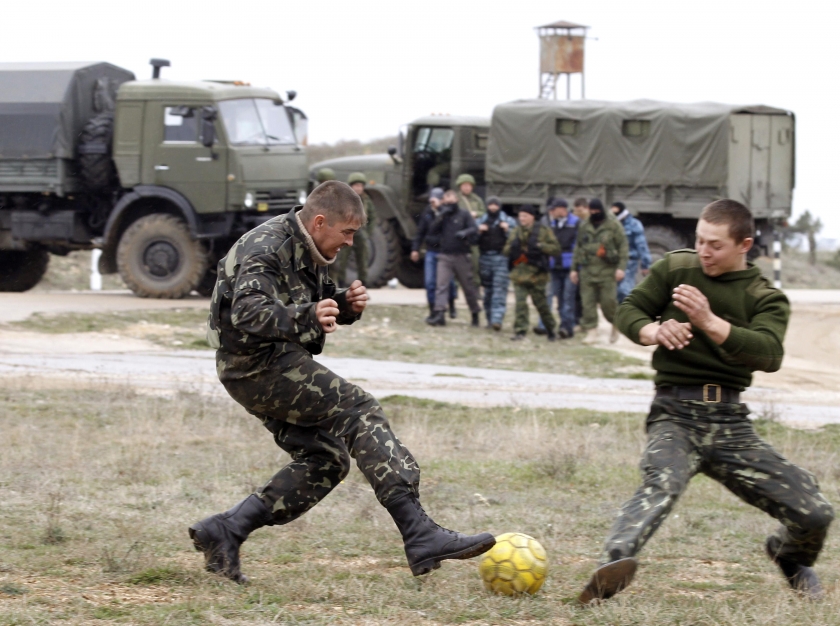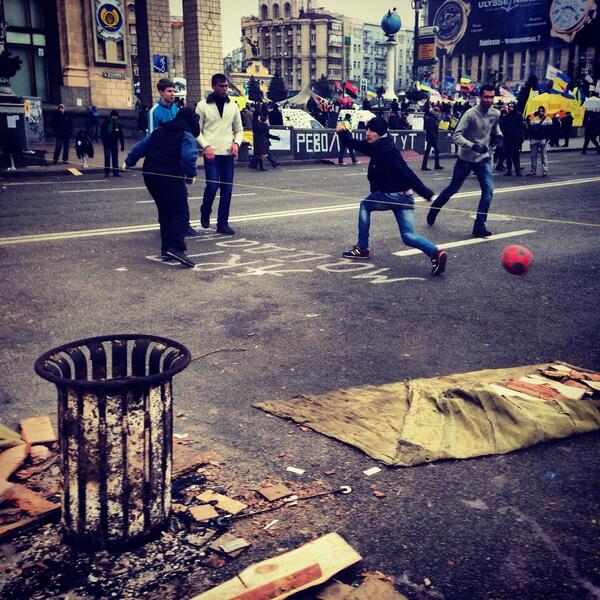By Yan Matusevich –
With Russian troops occupying Crimea, its former president in Russian exile as a result of months of popular protests, today’s Ukraine is a markedly different from the country, which co-hosted the Euro 2012 with its Polish neighbor. Despite the corruption of the Yanukovych administration and the money squandered on the tournament’s expensive infrastructure, hosting the European Championships was undoubtedly a source of pride for many Ukrainians, who saw the event as a symbol of a united and European Ukraine. From Donetsk to Lviv, the support for Ukraine’s national team was overwhelming, cutting across linguistic lines in both western and eastern Ukraine. Today, as the political crisis in Ukraine continues to escalate, resulting in the current Crimea crisis, the prevailing narrative in the media has been one of a country split by irreconcilable cultural and linguistic differences. Though the historical evidence to support this claim is apparent, this interpretation fails to capture the more complex and nuanced reality of post-Soviet Ukraine.
If Ukraine’s population as a whole is fairly evenly split between Ukrainian and Russian speakers, the country’s national team is clearly dominated by Russian-speaking players from the country’s two main footballing powerhouses: Dynamo Kiev and Shakhtar Donetsk. Out of the 22 players fielded for Ukraine’s last competitive match against France back in November, the team featured just three Ukrainian-speaking players: Artem Fedetskyi, Valeriy Fedorchyuk and the team’s veteran captain Anatoliy Tymoshchyuk. Indeed, it’s hardly a secret that Russian – or rather the Ukrainian-tinged dialect of Russian known as surzhik – is the language of communication within the national team. The absence of Ukrainian is almost an assumption given that Ukraine’s most successful clubs are concentrated in the capital and the eastern half of the country. In the context of the current tensions in Ukraine, in which the secession of some of the eastern parts of the country are now regarded as a real possibility, the Ukrainian national team offers an interesting insight into Ukraine’s post-Soviet generation.
As the Euromaidan protests raged onto the streets of Kiev, some of the usually apolitical players took to their social media accounts to express their support for the opposition. Throughout the upheaval, Ukraine’s veteran goalkeeper and Dynamo Kiev legend Alexander Shovkovskiy has not only actively supported the protests on Facebook, but was in fact spotted at many of the Euromaidan rallies in person. The unexpectedly violent crackdown by police forces of Euromaidan protesters back in November pushed more players to openly voice their solidarity with the protesters occupying central Kiev. A few players, such as Dnipro’s Ruslan Rotan and Dynamo Kiev’s Roman Bezus quietly changed their Instagram profile pictures to a black square with a Ukrainian-colored ribbon out of respect for the dead and injured protesters. Another Dynamo midfielder, Fedetskyi cautiously admitted to being generally sympathetic to the Euromaidan cause declaring EU membership as “the best path of development for today’s Ukraine”. Some players even managed to become victims of the violence themselves as Russian-born Dynamo player Vladyslav Kalytvintsev suffered a broken jaw at the hands of hired pro-Yanukovych thugs known as “titushki”.
While images of Ukraine as an ethnically and linguistically divided country of Yugoslavian proportions dominate the media landscape, there has been a remarkable level of solidarity in Ukrainian football in the face of the country’s ongoing political crisis. In an unprecedented act of unity, the Ultras of virtually every Ukrainian club – from Yanukovych’s hometown of Donetsk to the traditional capital of Ukrainian nationalism Lviv – put aside their differences and sided unilaterally with the Euromaidan protesters. Even the tense rivalry between Ukraine’s two perennial champions Shakhtar Donetsk and Dynamo Kiev has been put on hold as fans and players from both clubs agreed an unofficial truce for the duration of the revolution (See Futbolgrad‘s ‘Ukrainian Ultras and the Unorthodox Revolution‘).
This sense of camaraderie also permeates the younger generation of Ukrainian footballers, uniting players from different regions, playing for rivaling clubs. The best example of this is the Twitter duo of Dnipro’s Yevhen Konoplyanka and Shakhtar Donetsk’s Yaroslav Rakitskiy, who have become something of an online phenomenon, as the two friends from opposing clubs have come together to share their often sardonic views on the current situation. In response to Russian state propaganda about Ukraine’s imminent fascist threat, Rakitskiy tweeted “I rarely write on Twitter because Banderites keep beating me up and taking away my phone. I’m forced to go to Crimea for every tweet”. Konoplyanka, who has always had the reputation as the national team’s clown, took a jab at the Russian presence in Crimea by tweeting, “I hope there won’t be any Russian footballers without insignia trying to take my place in today’s lineup” before his team’s Europa League loss against Tottenham. Putin’s declaration that Russian forces were in Crimea to protect Russian speakers prompted Rakitskiy to enter the fray with the following sarcastic tweet: “Russian forces in Crimea in order to protect our rights? Where the fuck were you guys when we had a goal disallowed at the Euros?”. Humor aside, these tweets by two rising stars of Ukrainian football reflect the way a growing number of young Russian-speaking Ukrainians feel about the current political crisis.
Regardless of their political persuasions and native language, the Ukrainian national team has shown tremendous support for the protests in particular and their country in general. Indeed, the unity and sense of national pride exhibited by the predominantly Russian-speaking Ukrainian national team goes against the image of a country being ripped apart between Russian and Ukrainian speakers.
A look into the Ukrainian football world reveals the very real generational conflict that is taking place within Ukrainian society. While some older Soviet-era Ukrainians may have nostalgic memories of a common Soviet past, the new generation of post-Soviet Ukrainian footballers feels strongly about their country’s sovereignty, both in and outside of football. Out of respect for the protesters killed in Maidan, all Ukrainian teams dawned black armbands during their respective Europa League matches in February.
Even in Sevastopol, an alleged hotbed of Russian separatism and the home of the Russian Black Sea Fleet, fans and players of the local FK Sevastopol side have voiced their opposition to Russian annexation (See Futbolgrad‘s ‘Crimea Developments – The Lonely Voice of the Pro-Ukraine Tavriya Ultras‘).

Ukrainian servicemen play football near Russian military vehicles at the Belbek Sevastopol International Airport (Photo: Reuters)
In a championship where the average player grew up in an independent Ukraine without any memories of the Soviet Union, pro-Russian sentiments are hard to come by, even in the country’s supposedly secessionist east and south. In the face of a growing Russian military presence, Ukrainian footballers have debunked the myth of a linguistically and ethnically divided Ukraine, displaying remarkable solidarity between clubs and players from every corner of the country. If Russia thought it could convince a couple of Ukrainian footballers to switch over to the Russian national side through annexation, it better think again. Konoplyanka’s latest tweet says it all: “Putin, burn in hell. God help Ukraine” – written, of course, in his native Russian.
Yan Matusevich is a recent graduate of Bard College in Political Science who is currently based in Berlin. A native of St.Petersburg, Yan grew up living between Southern France, Alaska and the East Coast. As a lifelong football fan with a keen interest for everything post-Soviet, Yan spends his free time traveling through Eastern Europe and collecting football kits along the way. Read Yan’s blog Eastern Profiles for political commentary on post-Soviet spaces or find him on Twitter @ymatusik






















COMMENTS
hi there, i tried to reach you thruogh facebook, but no answer. 🙁 do you also have an email adress, where i can get in touch?
best and congratulations for a great blog
Martin / FSE